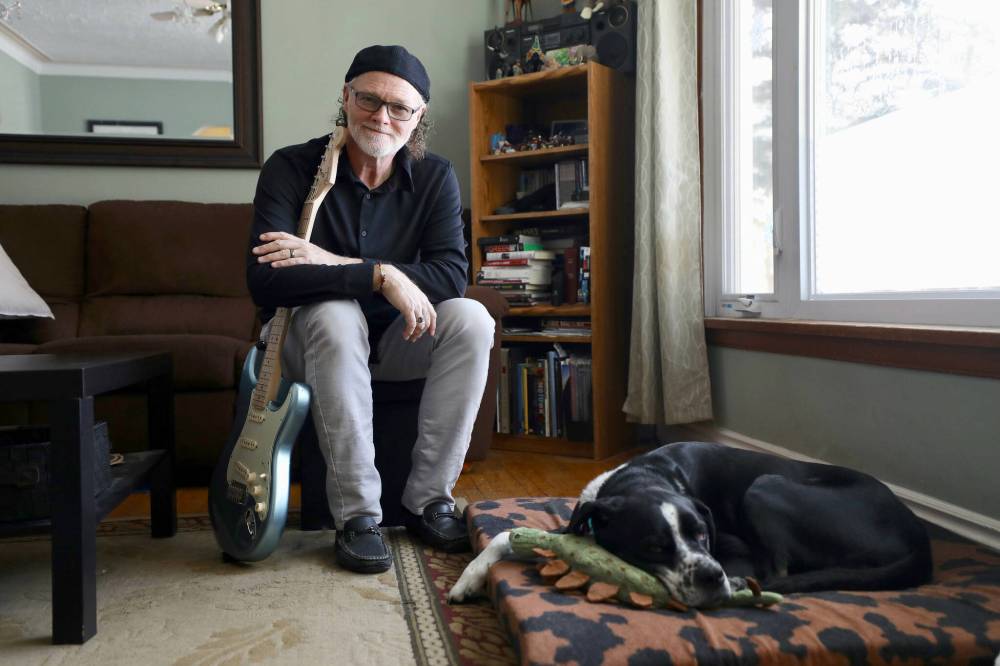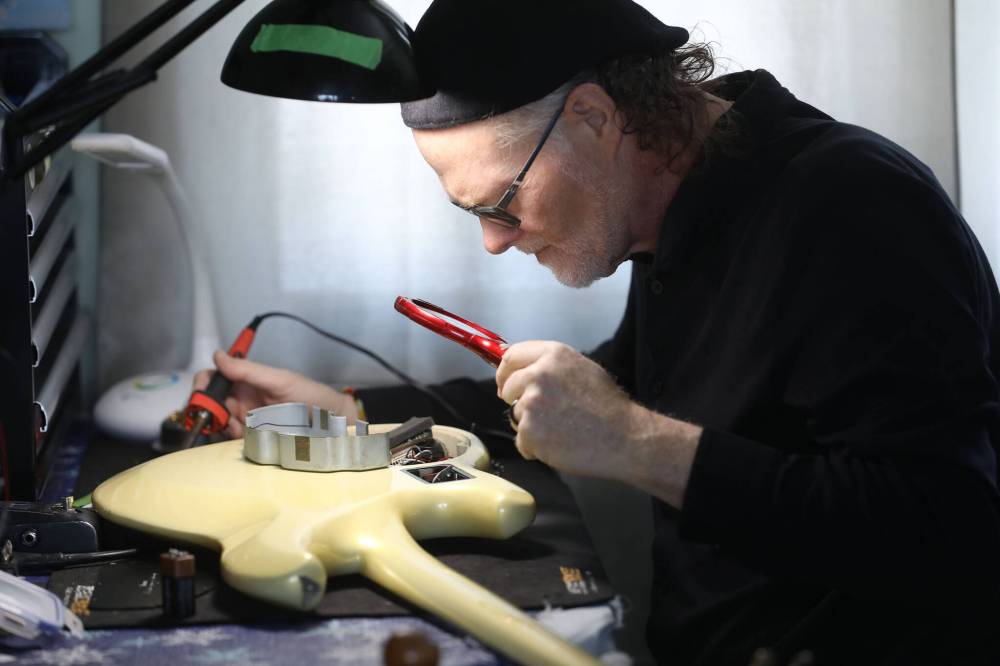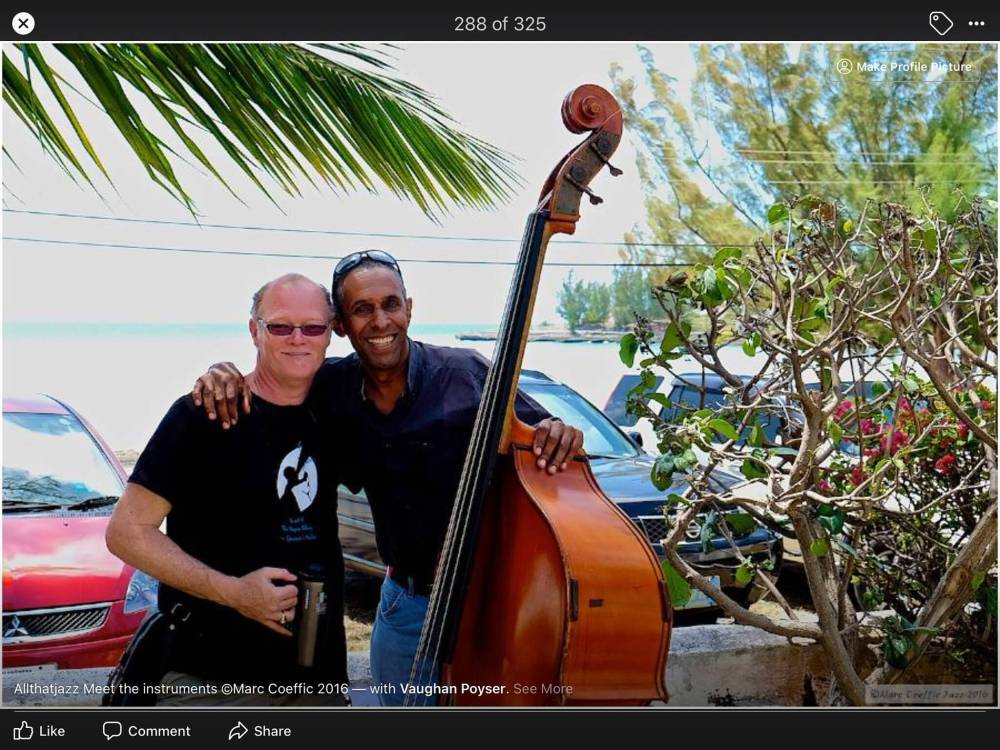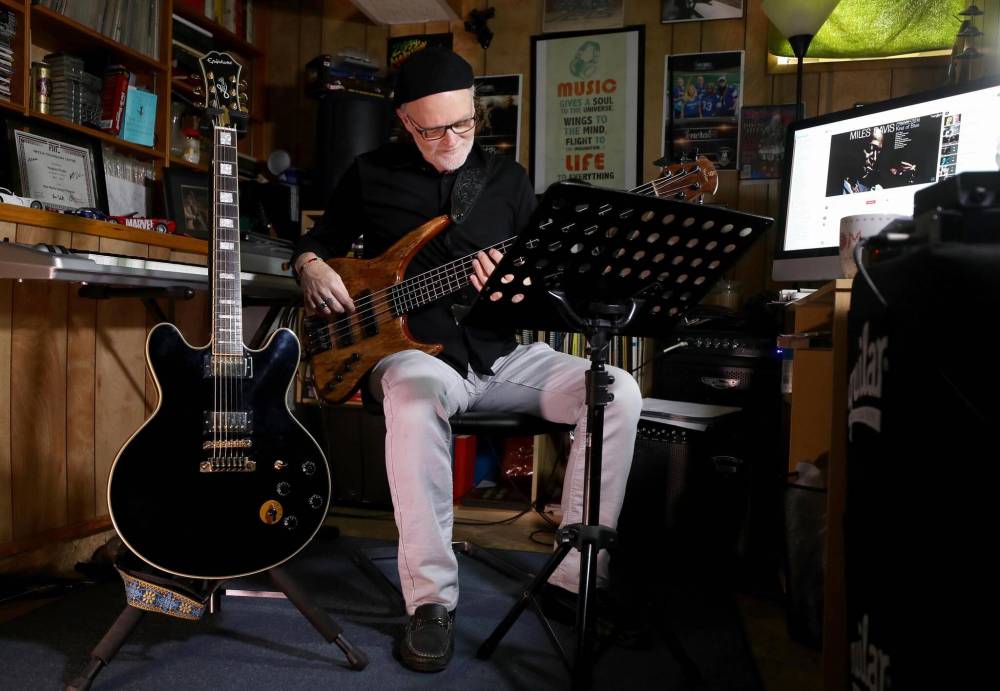Ace of bass
River Heights musician turning 12 notes into a lifetime career
Advertisement
Read this article for free:
or
Already have an account? Log in here »
To continue reading, please subscribe:
Monthly Digital Subscription
$1 per week for 24 weeks*
- Enjoy unlimited reading on winnipegfreepress.com
- Read the E-Edition, our digital replica newspaper
- Access News Break, our award-winning app
- Play interactive puzzles
*Billed as $4.00 plus GST every four weeks. After 24 weeks, price increases to the regular rate of $19.00 plus GST every four weeks. Offer available to new and qualified returning subscribers only. Cancel any time.
Monthly Digital Subscription
$4.75/week*
- Enjoy unlimited reading on winnipegfreepress.com
- Read the E-Edition, our digital replica newspaper
- Access News Break, our award-winning app
- Play interactive puzzles
*Billed as $19 plus GST every four weeks. Cancel any time.
To continue reading, please subscribe:
Add Free Press access to your Brandon Sun subscription for only an additional
$1 for the first 4 weeks*
*Your next subscription payment will increase by $1.00 and you will be charged $16.99 plus GST for four weeks. After four weeks, your payment will increase to $23.99 plus GST every four weeks.
Read unlimited articles for free today:
or
Already have an account? Log in here »
Hey there, time traveller!
This article was published 06/03/2022 (1322 days ago), so information in it may no longer be current.
When you need some bass in your neighbourhood, who you gonna call? Vaughan Poyser.
Wait, who?
Vaughan Poyser — he’s a man who’s turned four strings into about a million opportunities. A prolific and talented professional bassist who has been deeply involved in Winnipeg’s music scene for 40 years, you may have never heard of him by name, but you’ve probably heard his stylings or seen him on the stage without even knowing it.

Bass players are often ribbed for being the “forgotten” members of bands, and rarely get the limelight. It’s high time one takes centre stage.
Poyser was adopted at one-and-a-half years old by his father Lindsay and mother Evelyn; his two older siblings, Mike and Madelaine, were also adopted.
Lindsay and Evelyn didn’t know much about their youngest son’s birth family, except that he came from a “musical background.” Indeed, Poyser was smitten by music at a young age. He’d sneak into Mike’s room when Mike was out, listen to his records, and bang on his drum kit.
“I always had a love for music, always,” Poyser said during a wide-ranging two-plus-hour chat in the basement studio in his River Heights home on a recent weekend afternoon. “I never wanted to do anything else.”
Lindsay and Evelyn, trying to support their son’s interests, put him in every musical and artistic activity they could — the Royal Winnipeg Ballet, the Winnipeg Boys’ Junior and Senior Choirs, and piano lessons.
At 13, Poyser quit them all — “I didn’t think it was cool anymore.” He took a year off, but then picked up a bass for the first time.
It wasn’t because he had a strong attraction to the instrument. His best friend Eric Matheson and Eric’s older brother had already bought a drum kit and a guitar, respectively.
“What else do you need?” to start a band, Posyer asked rhetorically.
His parents told him they’d buy him one if he took lessons, and he agreed. After a year, his instructor told him he needed a better bass.
“I had the choice between a Gibson Grabber, which was Gene Simmons’ — this is 1978 — or Geddy Lee’s Rickenbacker 4001.”
“Well, I picked the Rickenbacker, and…” he said, pulling a cream-coloured bass off a stand behind the reporter, “I still have the Rickenbacker today.”
Teen jam bands only last for so long and when Poyser was about 19, put an ad in the paper as a bassist for hire. He met many new friends played in a rock-and-roll group called Session that got some local gigs.
He was then a member of a band called Steelwater that toured all over Western Canada for weeks at a time.

“We made very little money, the adventures were crazy — near death adventures,” he said of that time. During one drive through northern Alberta in the middle of winter, the band’s sound tech and driver fell asleep at the wheel of their school bus, which went into the ditch, hit a culvert, caught air, and landed 30 feet away from the highway in a snow drift.
This experience did not dissuade Poyser from wanting to pursue a music career, and his parents continued to support him in his endeavours.
“They never kicked me out, or said ‘come on, it’s time for you to get a job,’” Poyser said. “They never did that. I guess they always believed in me and believed in music.” He remembers his father would play ragtime piano every night after his children were put to bed.
But something soon happened that made Poyser call it quits.
In his mid-20s, he was dating Leah Speirs, who is now his wife of 30 years. While Poyser was on a tour, she called and reported she had come home to find her father dead; he had suffered a brain aneurysm. Her mother was already sick and in the hospital.
“So I came home, and quit, and got a job,” he said. But soon, Leah, who’d known her boyfriend since he was 15, knew he was unhappy.
“She just went ‘you’re going crazy, Vaughan. You’re sad. I can feel it… so go find a band and start playing.’ She kicked my butt back into playing. And so that just launched it again and it’s never gone backwards.”
He played in a number of bands thereafter, but his first big break came in the 1990s with a country group called Saddletramp. The band did tons of touring, had songs on the radio, clothing endorsements, and was raking in big money.
Photos of that time show Poyser with a mane of long, curly red hair and either an impressive Fu Manchu or goatee; during the interview, his red hair, long in the back, was held neatly back under a black backwards beret; his beard was trimmed to stubble and has turned white.
Playing in Saddletramp came with a hard-partying lifestyle.
“People were sending liquor up to us every night, six nights a week. So I would be coming home drunk six nights a week and we had two young children at the time,” he said. “That lasted two weeks and my wife said ‘make a decision. Music or your family.’ I went ‘well, there’s no choice. My kids, I choose my kids.’”
“She didn’t say ‘quit.’ She said ‘quit the alcohol,’” Poyser clarified. He acknowledged it’s important to hang out with fans and still did so on weekends.

“When my wife saw that I was working for music — not for the girls, not for the liquor, not for the drugs or anything — that I was doing it for the music, she was good with that.”
Saddletramp’s members eventually clashed over financial problems and executive meddling caused by a certain member. The rest of the band left and formed a group called Hatfield McCoy, the name being a nod to Saddletramp’s feud.
But Poyser saw the band going downhill after a while and he’d had enough of touring small towns and being away from Leah and his daughters Lindsay (named after his father) and Rebecca.
That’s when his career turned to the trajectory he’s still on today — from band musician to freelancer, teacher and producer.
Tyrone Rogers, a “dear friend,” recognized Poyser’s desire and drive. He told him to quit the band and go to school to study music.
“He convinced me to go to university, so I went to the University of Manitoba for three years,” Poyser said. While he didn’t graduate, it was a huge boon to his skills.
“Reading music, writing music, understanding music — it was everything,” Posyer said of his education. “I became a force. My ear training, all of that, became so much better… studying music, analyzing music and being able to write it: it changed my life.”
If not for that schooling, Poyser said he’d be working a day job.
After leaving school in 2003, the benefits of being a freelancer who stuck mostly in Winnipeg became clear. His income tripled, he could play more styles of music with more types of artists, and spend more time at home.
Rogers planted that seed as he’d told Poyser in the past: “the reason you’re not getting any phone calls right now is because you’re fixed in on this one band, you’re going out of town all the time, so people can’t book you or rely on you. Once you stay home, you’re going to get tons of gigs in town.”
Poyser didn’t believe Rogers at first, but soon found he was right.
“I could take a gig that required me to learn 30 songs. The night before, I could chart all the songs, do the gig, and get paid good money. I understood music more completely, harmony… lead singing, and all that. It made my life way better.”

Poyser kept working hard to improve his aptitude, not just at bass, but also on the business and management side.
He manages social media — when he started, it was Myspace and now it’s Facebook and Instagram — and websites, finds gigs for the bands he freelances with, and books them.
“That’s just all I do. I’m never just the player… people say I’m very helpful,” he said.
Poyser has a well-deserved reputation as a go-to-guy in town. He’s played and recorded with countless groups over the years, including Chris Bigford, Leanne Goose, Billy Joe Green, Joey Gregorash, Jennifer Hanson, Hillbilly Burlesque, Solomon King, Big Dave McLean, the Round-Up Band (which has been playing country tunes at Transcona’s Silver Spike Saloon for 20 years,) Streetheart, and Brandi Vezina
He also acted as a consigliere of sorts for friend Don Boucher, who ran a jazz festival in the Bahamas throughout the 2010s. It was originally established to raise money for Bahamian women on the island Boucher lived who couldn’t afford to fly to Nassau to get breast exams.
Some of his biggest influences are world-famous titans such as Donald (Duck) Dunn, Geddy Lee, Jaco Pastorius, and Victor Wooten.
He also credited local bassist Gilles Fournier for giving him an “aha” moment.
At a party for Poyser’s cousin, a prolific piano player, five different bass players performed. “They were all great but there was something over-and-above with Gilles, and that night it was totally apparent,” Poyser said.
After the show, Posyer asked Fournier: “Throw me a bone here. Whatever you tell me, I’ll go home and I promise I’ll practise it for a year. Give me something — give me a little bit of Gilles Fournier so I can bring it into my playing.”
Fournier’s answer was cryptic. “Vaughan, there’s only 12 notes.”
Poyser didn’t get it. “I’d been to university. I knew there’s only 12 notes,” he said to the reporter.
Fournier repeated: “Vaughan, there’s only 12 notes.” Then Poyser got the lesson.

Fournier wanted Poyser to cultivate his own identity as a bass player — not just sound like him.
“What I took from that was that I just saw five guys all playing the same notes, but it was his choices… what choices you make, makes you sound who you are… I’ve always carried that with me.”
Poyser is an influence on bassists himself. He has taught for the past 20 years, conducting private lessons for people of all ages and skill levels.
He describes his lessons as a “constant conversation about music” and doesn’t give tests or exams. Lessons involve a whole lot of playing and some theory; halfway through his teaching career, he took a “right turn” to focus on the songs and music his students are interested in, rather than make them play certain genres. This is a similar tack to Poyser’s early teacher.
“He would teach me my favourite songs — not teach me his songs — he would teach me songs that I liked so that way I would go and practice every day,” he said.
“Music theory applies to every song, so why would I get them to learn my songs?”
He simply asks his students to play every day. He doesn’t care how long (he plays at least an hour a day), as long as they enjoy it. He has students that have gone on to Berkeley and The Julliard School in New York City.
The past two years have been challenging for musicians. Once COVID-19 arrived in Manitoba almost 24 months ago today, performances were cancelled and venues shuttered, amps off, stage empty, lights down. Even between waves, shows were few and far between.
Poyser admitted to being depressed at first. “Never in my 40-year career, have I ever not had gigs,” he said. “The pinnacle to your hard work is a gig. Gone. Every gig is gone.”
He credited the Canadian government for supporting musicians with CERB, and soon saw the pandemic as an opportunity.
“I just got busy. It’s kind of simple sometimes,” he said. “Everything’s shut down, so now you’ve got a clean slate? What do you do?”
He transitioned his lessons to online and gave them for free, feeling it wasn’t right that he collected CERB without giving something back. He started a recording studio in his home. He hit the books. He learned more about fixing guitars and basses and now offers repair services.

“When COVID hit, nobody was working, but I was.” He saw the CERB as his wage. “If I’m being paid, I should be doing something.”
Poyser came through the pandemic all right, but that doesn’t mean he’s not happy life is becoming “normal” again — he played with the Jennifer Hanson-led house band at Winnipeg Blue Bombers’ games half-time shows and also plays with cover band Go For A Szoda. He’s looking forward to doing more with his home studio, recording some tunes with Brandi Vezina, and travelling to The Bahamas again later this month.
I would have been remiss to not give Poyser a chance to strut his stuff. Putting him on the spot, the interviewer requests a pair of well-known songs with notoriously difficult and intricate basslines: Stevie Wonder’s Sir Duke and Rush’s Red Barchetta.
Happy to oblige, Poyser picks up a well-used Fender and is quickly in his element.
When Poyser plays, everything else becomes incidental and the bass seems designed to be around his neck and in his hands. His head bobs, his foot stomps, and his fingers fly over the frets. Going through the frenetic solo section of the Stevie Wonder tune — where the bass plays along with a fast-paced trumpet — he does well considering the request was sprung on him, but owns a slight slip with a “sorry!” nonetheless.
Poyser agrees that Sir Duke is a song every bassist should know, before moving on to the Rush epic about a countryside race in the titular banned-from-the-roads sports car.
“Oh man, do I remember this?” Poyser asks, but it’s clear he does. Some parts are rusty, and he acknowledges as such with a “been a long time.” Soon, though, he’s singing along with Lee — “I strip away the old debris/That hides a shining car/A brilliant red Barchetta/From a better vanished time…”
Poyser is as proud of his family as his career. He speaks glowingly of his daughters Lindsay — who recently began her “dream job” working with children and adults with neuromotor disorders and fights MMA — and Rebecca, who is a massage therapist.
Leah has been an EA in a nearby school for more than 15 years; she and Vaughan ride his Harley together in the summer.
He’s also a doting dad dog of Abbie, a nine-year-old pointer hound, and Tucker, a seven-year-old pug (Tucker’s snoring is the background track for the interviewer’s audio recording).
Remember when we said it was just by chance that bass became Poyser’s instrument of choice, because that’s what was needed for his teen band? Depending on how much stock you put in kismet or predestination, the story’s a little more complicated than that.
When his parents died in the 1990s, Poyser bought their house — where he still lives today — from their estate. With their estate came his adoption papers. He vowed not to look at them but Leah and Madelaine did; Madelaine eventually spoiled his birth name, despite his request to the contrary.

He got a letter that went into more detail about his birth mother, which devastated him. He ripped it up.
He didn’t pursue more, but his historian niece encouraged him to get his blood tested and look further into his ancestry. Within three months, he had names. He discovered he has a full brother and a half-sister. He connected on Facebook with his uncle; the two men bear a close resemblance.
He also came across a photo of his birth family’s band — remember the “musical background?” — and showed it to the reporter.
In the photo, Poyser’s birth mother, Sandra McAuley, is playing bass.
“It completed me,” Poyser said. “There was no wondering anymore who I was.”
McAuley died in 2011. Her grave site is about 50 feet from Lindsay and Evelyn’s.
“I would really love to tell my birth mom that she did well,” Poyser said. “That as hard it was to give me up — or not, whatever — that if she ever wondered about me, know that she did the right thing, that she did good, because I’m great.”
“I’m blessed, I’m blessed, and I’m blessed.”
declan.schroeder@winnipegfreepress.com

